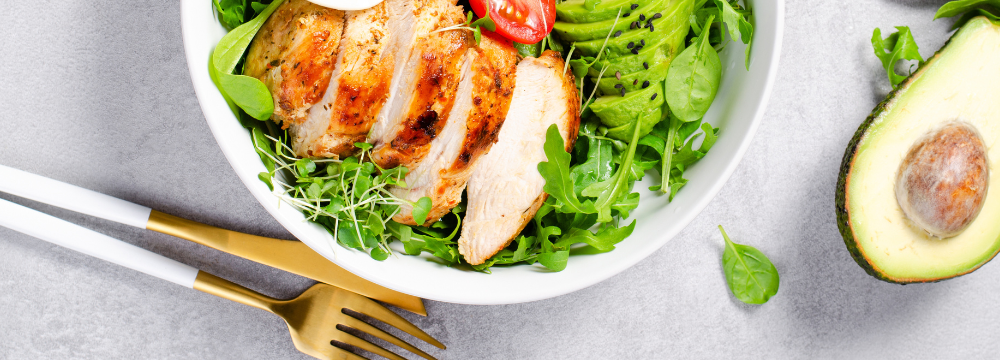
If you go to the health book aisle of any bookstore in the U.S., you’ll see an ocean of books outlining weight loss plans, fads, and techniques. Each promises its method is the key to shedding pounds and keeping them off for good, but evidence suggests embarking on these restrictive regimens is unlikely to work.
Going on a diet without a more significant lifestyle shift may actually make you more likely to gain weight. A review1 published in 2013 found that of the 20 studies the researchers analyzed, 15 showed that “measures of dieting significantly predicted future weight gain.” How could this be? Some psychologists believe the culprit is what happens when you fall off the dieting “wagon.” Restrictive diets are hard to stick to, and most people are bound to slip up at least a few times. When that happens, a common reaction is to consume even more forbidden foods; the dieter figures since they’ve already messed up, they might as well go big. Diets can also make you even more obsessed with food than you were pre-diet particularly if the plan you’re following cuts out food you love, like pasta or beef.
So, if diets have slim chances of success, what can you do instead? Here are a few techniques that you can use in place of a restrictive eating plan.
Strategy #1: Restrained Eating
In the 2013 review mentioned above, weight loss regimens that used so-called “restrained eating” practices, like taking smaller portions, only predicted weight gain 5% of the time. While restrained eating didn’t necessarily predict weight loss in this review, it’s evidence that making less dramatic changes to your food intake can be more helpful than sweeping changes. Drinking water instead of sugary sodas or fruit instead of pastries are both small switches that are easier to maintain over a longer term. You can then stack habits going forward.
Strategy #2 Exercise
While working out can’t entirely eliminate the effects of an unhealthy diet, it can boost your weight-loss efforts by providing additional calorie burn. In general, one mile of walking or running burns 100 calories. Pair that with a modest eating reduction, and you’ll put yourself on the path to losing pounds. Plus, you’ll improve your cardiovascular health, making you less likely to develop heart disease. How much should you start with? The U.S. Department of Health and Human Services’ Physical Activity Guidelines for Americans recommends 150 minutes of moderate-intensity aerobic exercise per week, which equals about 20 minutes daily. If you’re new to exercise, go slow initially and consider getting guidance from a personal trainer to avoid injury.
Strategy #3 Better Food Quality
Some diet plans focus primarily on calories, meaning you could continue to eat low-quality processed foods and stay true to your diet. However, calories from cookies, chips, and fried foods are much less nutritious and filling than calories from whole grains, fruits, vegetables, and lean meats. Plus, if you’re eating sugary foods, you’re prone to blood-sugar spikes and dips, which can further stoke your appetite. Replace some of the junk with good-for-you foods, and you’ll find that your healthy eating habits are much easier to maintain.
Strategy #4 More Water
Being adequately hydrated doesn’t just feel good, it can increase your metabolism. Moreover, it can increase feelings of fullness, making you less likely to overeat. Try consuming a full glass (8-12 oz) of water before meals; you may find you’re not as hungry as before. Guidelines recommend adult women drink about 9 cups of water daily, while men should get 13. This is in addition to the water you take in through foods and other beverages, like coffee. It’s a simple change that can provide significant benefits.
Strategy #5 Better Sleep
You may not be able to snooze your way to slimness, but adequate rest can be a game-changer when added to other healthy habits. A study recently published in the journal Obesity found sleep deprivation decreased leptin, a hormone associated with feeling satiated, among test subjects. The lack of sleep also increased ghrelin levels, a hormone stimulating hunger. Not sure if you’re getting enough? The American Academy of Sleep Medicine recommends that adults sleep anywhere from 7 to 9 hours per night for optimum health. If you’re having trouble achieving that, follow some important tips for better sleep, including:
- Avoiding caffeine and nicotine before bed
- Exercising regularly
- Sticking to a consistent sleep schedule
- Keeping the room cold and dark
- Not eating too late
- Putting down the electronics well before bed
- Additionally, many obese patients also have sleep apnea. One sign of this is snoring. If you snore, undergoing a sleep study can diagnose sleep apnea. Proper treatment of sleep apnea will increase your sleep quality.
Talk to your doctor if you’re doing all these things and still having trouble getting shut-eye.
The Bottom Line
It’s important to approach what we would call a diet with a slightly different mindset. Instead of thinking of it as a temporary shift, we must consider these changes to be permanent. We prefer to call it a lifestyle change versus a diet. Any lifestyle change requires moderation for sustainability and a holistic approach to address all the concerns and issues we may be facing due to our excess weight. From eating better to exercising more and sleeping, lifestyle change is straightforward but not easy. Of course, we are always here to help.
1Lowe MR, Doshi SD, Katterman SN, Feig EH. Dieting and restrained eating as prospective predictors of weight gain. Front Psychol. 2013 Sep 2;4:577. doi: 10.3389/fpsyg.2013.00577. PMID: 24032024; PMCID: PMC3759019.










